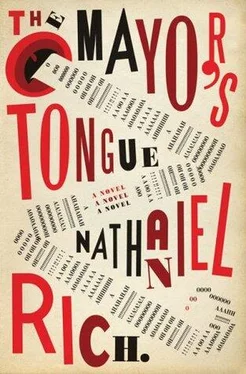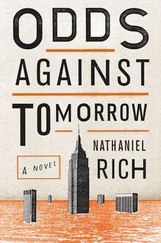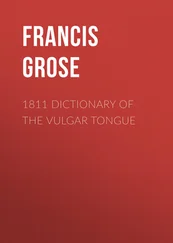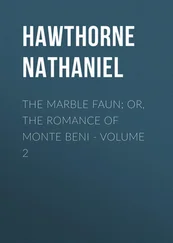Back inside the mansion, the banquet table had been cleared and reset with plates piled with banana splits, puddings, pies and cakes, and bottles of port, sherry, and cognac, even crème de cacao. Eakins began to gorge without hesitation or mercy.
"Have some," he said. A curtain of chocolate sauce fell from his mouth onto his chest, clinging to the forest of hair there. "It's good."
"Mr. Eakins—"
"Call me Connie!"
"Connie—"
"That's much better. Because we're friends, you know."
"Thank you. Connie, I have a lot of respect for you." He paused, distracted by the sight of Eakins kneading the crust of a cheesecake with one hand; with his other hand he lifted to his mouth a chocolate mousse.
"But I need to say again," continued Eugene, "that I came here for Sonia. She's coming home with me."
Eakins spat out what was then in his mouth — a jet of cognac, viscous with cake crumbs and chocolate mush.
"DAMN IT!" he yelled. Eakins gulped down a snifter of the cognac, threw the glass into the corner — where it shattered— and then lifted the bottle to his mouth and chugged vigorously. He licked his lips. "WHAT DID I TELL YOU? She came here for me."
Eugene realized he was shivering.
"Yes, Mr. Eakins," he said. "She came here for you, but she came because her father sent her. It was not. . an offering."
Eakins smiled at Eugene.
"I don't think you understand," he said. "Agata may have come here for all kinds of reasons. But she has stayed here because she wants to be with me. She's mine. Do I need to explain to you what that means?"
"I think you should," said Eugene. He immediately regretted it. Because the next moment Eakins began to explain, in a tender, almost effeminate tone, what it meant: that Sonia had performed on Eakins a series of acts so full of depravity that Eugene could do nothing but laugh in response — a miserable, shocked laughter. Eakins took no notice and kept going, pausing only to take large swooping mouthfuls of air. The details became more horrible, and more specific, and Eugene began to recognize several of them from his own experience — a birthmark on Sonia's upper thigh, the feline way in which she arched her back, a certain kind of laughing sigh she made. Eugene wanted him to stop, but he also could not help wanting to hear more, the way a cuckolded man will become an implacable detective, continuing his investigation until he reveals every last sordid detail. Eakins was a talented storyteller. But it became too much to bear when he began describing certain freakish aspects of his own anatomy, most disturbingly, the prodigious length of his purple-black tongue, which he now let hang from his lips, in all its glory. It looked like an infant was reaching its leg out of his mouth; it was muscular and seemed to be coated with very fine down.
"Stop," cried a voice from the other end of the hall. It was Sonia.
"Sonia! You didn't tell me he was insane."
"It's not. ." Her eyes locked with Eakins's, and her voice faded out.
"She's a beautiful child," said Eakins, his evil appendage withdrawn and his voice returned to his normal bass. "She should be in a place where she's made to feel beautiful."
"But what about all your whores? Peachy Peach and Betsy Loraine and Gorazda—"
"They're not exciting to me anymore. Agata is more real to me than any of them. She's the first person I've let in. It's as if I dreamt up this whole town for her. She makes me feel real again."
Sonia was looking at Eugene with a look of pity.
"Sonia?" said Eugene, his voice rising. "What's happened to you?"
She came over and put her hand on his arm. "I can see why you're reacting this way," she said. "But I'm happy here. He un derstands me." She turned to Connie. "Can you leave us and go out in the garden for a minute?"
"Yes, Agata. And Eugene, for God's sake, don't leave without this."
He held out Alvaro's manuscript, and Eugene's translation. Eugene snapped them out of his hands. Eakins bowed and went into his garden.
"If you need me," he called out behind him," I'll be staring at the sea."
When Eugene and Sonia left the mansion, the sun was setting over the horizon and hot in their eyes.
"I came all the way here for you," said Eugene.
Sonia sighed.
"Look," she said. "I do like being here, but if you want to know the truth, I may not even stay for that much longer."
"So you'llcome back with me? To New York?"
"That's not what I said. I was sorry to leave you in New York, but I realized, once I got here, that I barely knew you."
"What does that mean? I–I love you. I came here for you. I understand you, not him. Come on, let's leave. Together."
Sonia bit the inside of her lip, and then gave him a sideways smile.
"You're wrong about Connie," she said. "And you're wrong about yourself. You didn't come here for me. How could you have? I was like a story you wrote in your head. A dream you had."
"That's not true. Don't you remember our time together?"
"Of course, but did those moments carry you all the way here? Please, Eugene. You should go off, by yourself, and try to figure out why you came to Italy. It wasn't for me. You won't think about me too much longer. And if you see my father before I do," said Sonia, "tell him I'm happy again."
"Please, Sonia—"
"That's not even my name," she said. "It's Alison. You're the only one who calls me Sonia."
"I thought your friends called you Sonia."
"I never said that. I said that you could call me Sonia. My friends call me Alice."
Eugene looked one more time at Sonia. Her features seemed to be rearranging themselves before his eyes even as he watched her. Then he turned and fled from the Casa Contenta. He ran down the main street of Idaville — where Eakins's creations stared and cowered and cursed — through the narrow ravine and into the great valley, surrounded by the mountains of the Carso. It was black night now and the crisscrossing streams reflected the yellow moonlight. Eugene grasped his notebook close to his chest and wiped his eyes with his sleeves. He was exhausted and weepy and the valley was so expansive that he could not imagine crossing the whole thing. He tripped and fell in a wet patch of grass. He felt his notebook; it was damp, and he feared the ink would bleed. He'd have to pause here, in the middle of the valley, under a small thicket of beech trees.
He rested his head on his bag and lay down. Before he closed his eyes he thought he could see, among the distant groves, the silhouettes of several of Eakins's children. They seemed to be watching him with great curiosity, and fear.
At first light, when the sky turns dim and blue, Mr. Schmitz rouses himself. He puts his head very close to Rutherford's, so close that their noses brush each other for an instant, giving Mr. Schmitz a minor static shock. It has a galvanizing effect.
Mr. Schmitz rededicates himself to Rutherford's speech therapy. When he exhausts the familiar conversation topics, he moves to monologues, then diatribes and rants. He can sense that he has Rutherford's attention, but has no tangible proof — Rutherford's slow breaths and his heavy pulse are the only signs of life. Mr. Schmitz decides that he needs to find a subject that can last him indefinitely. He paces furiously around the room, grows tired, and sits on the floor. For many minutes he agitates his chin with determination and then flicks dandruff from the shoulders of his navy polo shirt.
Then it comes to him — he knows what he will talk about. His eyes glimmer darkly and his chin is rosy.
Rutherford's head has slumped over at some point in the night. Mr. Schmitz now pushes it up into place with a not entirely gentle nudge.
"You're perking up already," he says. "Listen here: I'lltell you about the cities of another country we know. Maybe it'llbring you back to your past. To yourself."
Читать дальше












